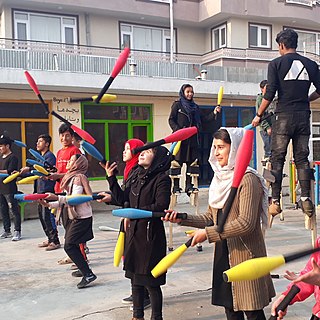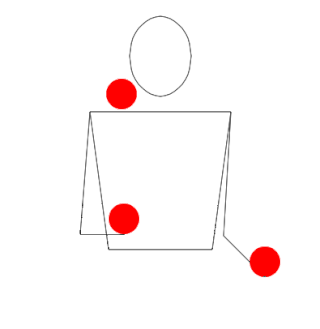Related Research Articles

Juggling is a physical skill, performed by a juggler, involving the manipulation of objects for recreation, entertainment, art or sport. The most recognizable form of juggling is toss juggling. Juggling can be the manipulation of one object or many objects at the same time, most often using one or two hands but other body parts as well, like feet or head. Jugglers often refer to the objects they juggle as props. The most common props are balls, clubs, or rings. Some jugglers use more dramatic objects such as knives, fire torches or chainsaws. The term juggling can also commonly refer to other prop-based manipulation skills, such as diabolo, plate spinning, devil sticks, poi, cigar boxes, contact juggling, hooping, yo-yo, and hat manipulation.

In toss juggling, a cascade is the simplest juggling pattern achievable with an odd number of props. The simplest juggling pattern is the three-ball cascade, This is therefore the first pattern that most jugglers learn. However, although the shower requires more speed and precision, "some people find that the movement comes naturally to them," and it may be the pattern learned first. "Balls or other props follow a horizontal figure-eight [or hourglass figure] pattern above the hands." In siteswap, each throw in a cascade is notated using the number of balls; thus a three ball cascade is "3".
In the cascade, an object is always thrown from a position near the body's midline in an arc passing underneath the preceding throw and toward the other side of the body, where it is caught and transported again toward the body's midline for the next throw. As a result, the balls travel along the figure-eight path that is characteristic of the cascade.

Juggling clubs are a prop used by jugglers. Juggling clubs are often simply called clubs by jugglers and sometimes are referred to as pins or batons by non-jugglers. Clubs are one of the three most popular props used by jugglers; the others being balls and rings.

Passing is the act of juggling between two or more people. It is most commonly seen as a subset of toss juggling.

Freestyle wrestling is a style of wrestling. Along with Greco-Roman, it is one of the two styles of wrestling contested in the Olympic Games. American high school and men's college wrestling are conducted under different rules and termed scholastic and collegiate wrestling. American collegiate women's wrestling is conducted under freestyle rules.

Toss juggling is the form of juggling which is most recognisable as 'juggling'. Toss juggling can be used as: a performing art, a sport, a form of exercise, as meditation, a recreational pursuit or hobby.
Vladimir, known as Vova, and Olga Galchenko were a brother and sister juggling team originally from Russia, active from approximately 2001 to 2009. They specialized in club juggling, particularly technical solo juggling, technical club passing and numbers club passing.
The art of juggling has existed in various cultures throughout history. The beginning is uncertain. The first depictions were found in ancient Egypt, China, Greece, and Rome, as well as medieval and modern societies.
Juggling practice has developed a wide range of patterns and forms which involve different types of manipulation, different props, numbers of props, and numbers of jugglers. The forms of juggling shown here are practiced by amateur, non-performing, hobby jugglers as well as by professional jugglers. The variations of juggling shown here are extensive but not exhaustive as juggling practice develops and creates new patterns on a regular basis. Jugglers do not consciously isolate their juggling into one of the categories shown; instead most jugglers will practice two or more forms, combining the varieties of juggling practice. Some forms are commonly mixed, for example: numbers and patterns with balls; while others are rarely mixed, for example: contact numbers passing. Many Western jugglers also practice other forms of object manipulation, such as diabolo, devil sticks, cigar box manipulation, fire-spinning, contact juggling, hat manipulation, poi, staff-spinning, balancing tricks, bar flair and general circus skills.

Juggling world records comprise the best performances in the fields of endurance and numbers juggling.
Anthony Gatto is an American juggler who holds several juggling world records. He began performing in Las Vegas at the age of ten.

Many countries, cities or juggling clubs hold their own annual juggling convention or juggling festivals. These are the backbone of the juggling scene, the events that regularly bring jugglers from a wide area together to socialize. The attendance of a convention can be anything from a few dozen to a few thousand people.
Since the late 1980s, a large juggling culture has developed, revolving around local clubs and organizations, special events, shows, magazines, video sharing websites, Internet forums, juggling competitions and juggling conventions. Populating the scene are many juggling celebrities who are notable for being good or creative jugglers, entertaining performers, convention organizers, experts in their field, having a strong presence online or just for having an interesting personality, character or style.
When you pulled out three balls in 1973, what was going through people's minds was, 'I saw a deformed midget do that once.' But when you pulled out three balls in the '80s, it was, 'a guy in my dorm room used to do that.'

Competitive or sport juggling may range from friendly and silly games to competitive sports. Most juggling conventions include friendly games such as endurance and gladiators. Since 1969, the International Jugglers' Association (IJA) has held annual stage championships, judged both on technique and presentation. The stage championships have three categories: Individuals, Teams and Juniors. First, second and third-place winners in the Stage Championships are awarded medals and money prizes. In addition, the Numbers Championships awards Gold medals to those who demonstrate that they can juggle the most balls, clubs or rings for the most catches.
Jason Garfield is a juggler and entertainer from Norfolk, Connecticut, United States. He is the founder and president of the World Juggling Federation (WJF).

The World Juggling Federation (WJF) is the world's only organization devoted to the promotion and advancement of juggling as a sport.

The International Jugglers' Association or IJA is the world's oldest and largest nonprofit circus organization, and is open to members worldwide. It was founded in the United States in 1947, with the goal of providing, "an organization for jugglers that would provide meetings at regular intervals in an atmosphere of mutual friendship." Although its focus lies on juggling, its programs also support other circus disciplines.

Juggling balls, or simply balls, are a popular prop used by jugglers, either on their own—usually in sets of three or more—or in combination with other props such as clubs or rings. A juggling ball refers to any juggling object that is roughly spherical in nature.

Burt Blague is a 4th generation artist, circus performer, comedian, director, teacher and producer.
References
- ↑ "Thomas Dietz - Vita". Thomas Dietz. Archived from the original on July 19, 2011. Retrieved December 12, 2010.
- ↑ "List of Numbers Juggling Records". Juggling Information Service Committee on Numbers Juggling (JISCON). Retrieved October 16, 2009.
- ↑ "Championships Results - 57th IJA Summer Festival". International Jugglers' Association. Archived from the original on July 17, 2011. Retrieved December 12, 2010.
- ↑ "The 2004 WJF Championships". World Juggling Federation. Archived from the original on July 17, 2011. Retrieved December 12, 2010.
- ↑ "WJF2 - The 2005 WJF Championships". World Juggling Federation. Archived from the original on July 17, 2011. Retrieved December 12, 2010.
- ↑ "2006 Competition Results". World Juggling Federation. Archived from the original on October 8, 2010. Retrieved December 12, 2010.
- ↑ "WJF4 Competition Results". World Juggling Federation. Archived from the original on September 11, 2010. Retrieved December 12, 2010.
- ↑ "WJF5 Competition Results". World Juggling Federation. Archived from the original on May 23, 2010. Retrieved December 12, 2010.